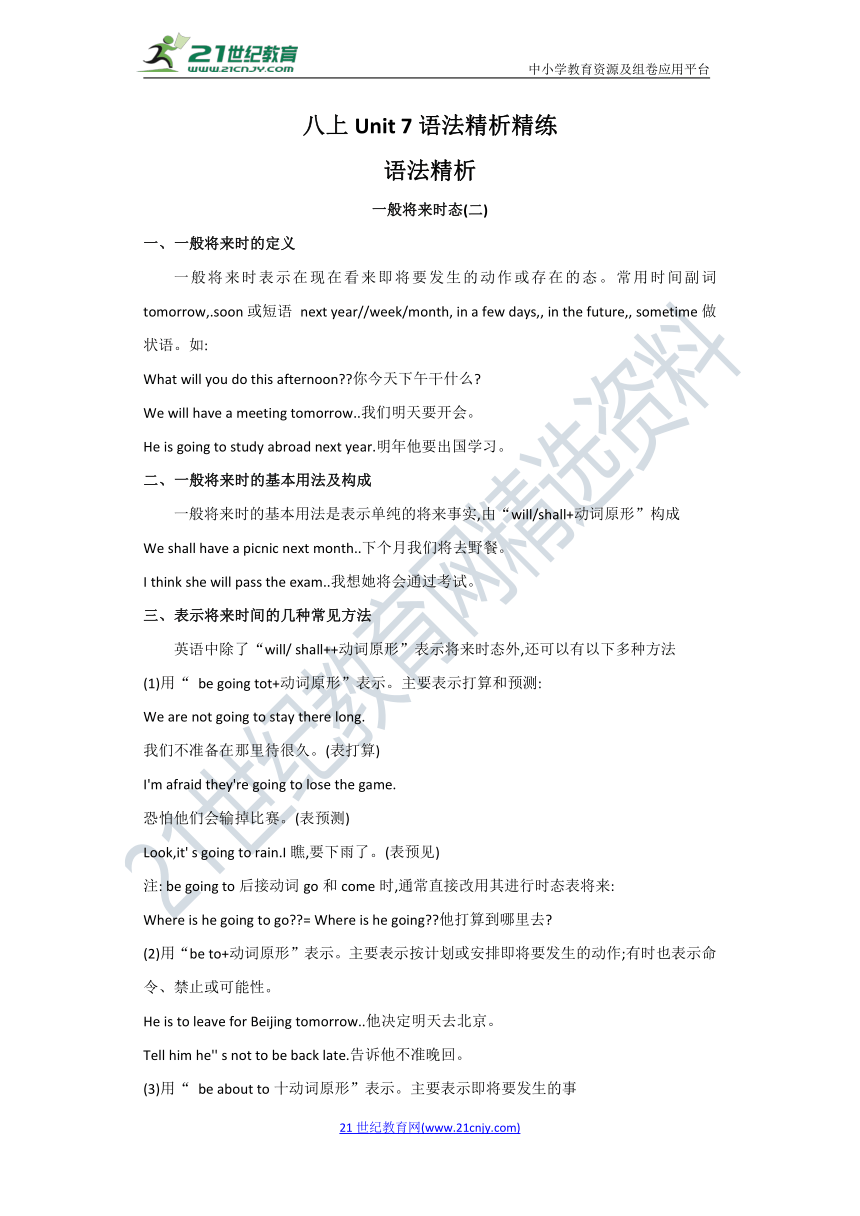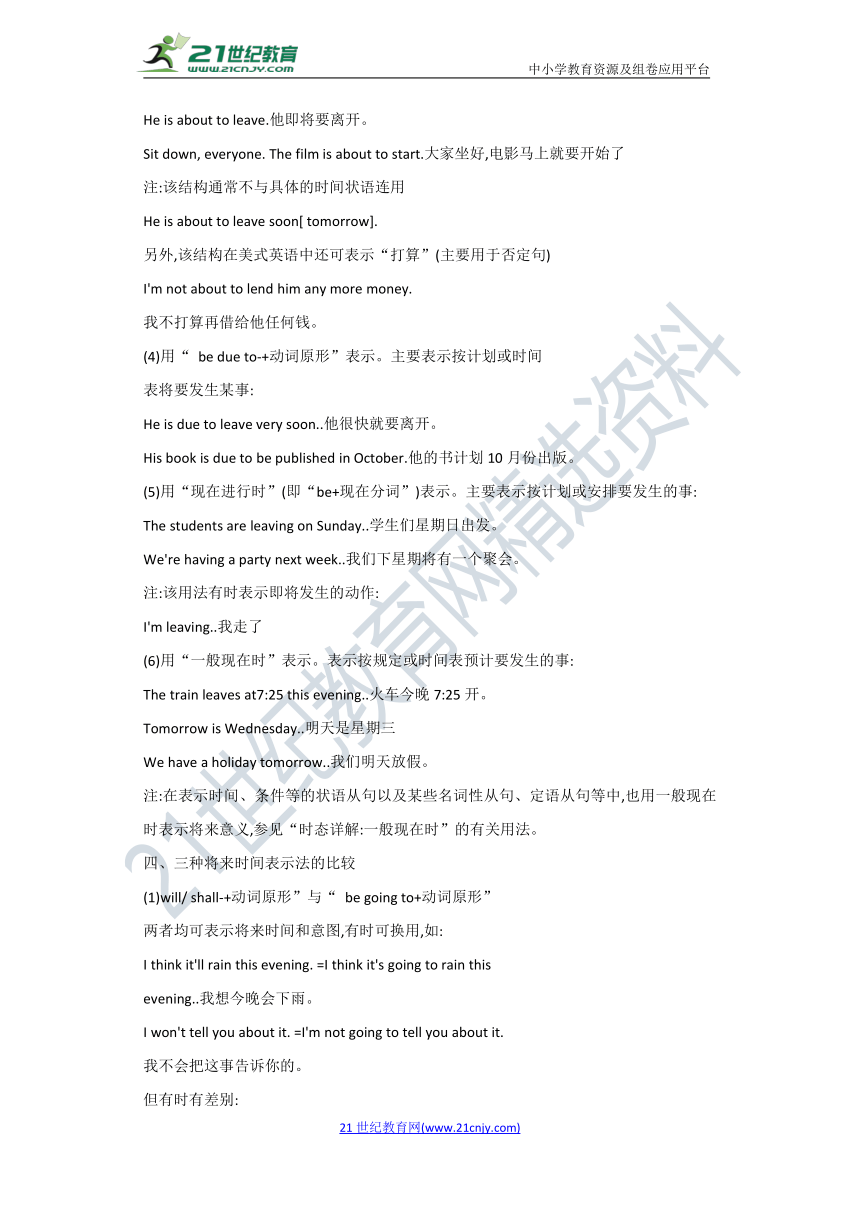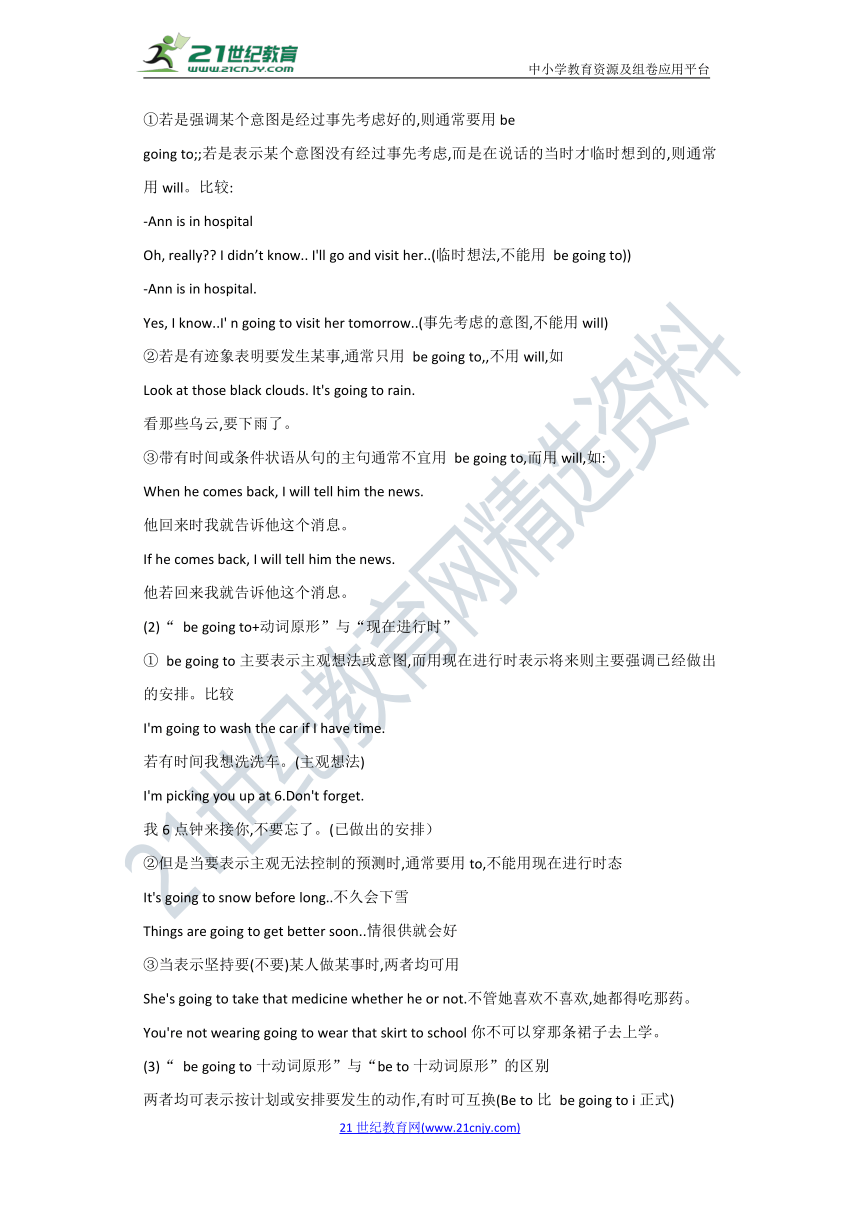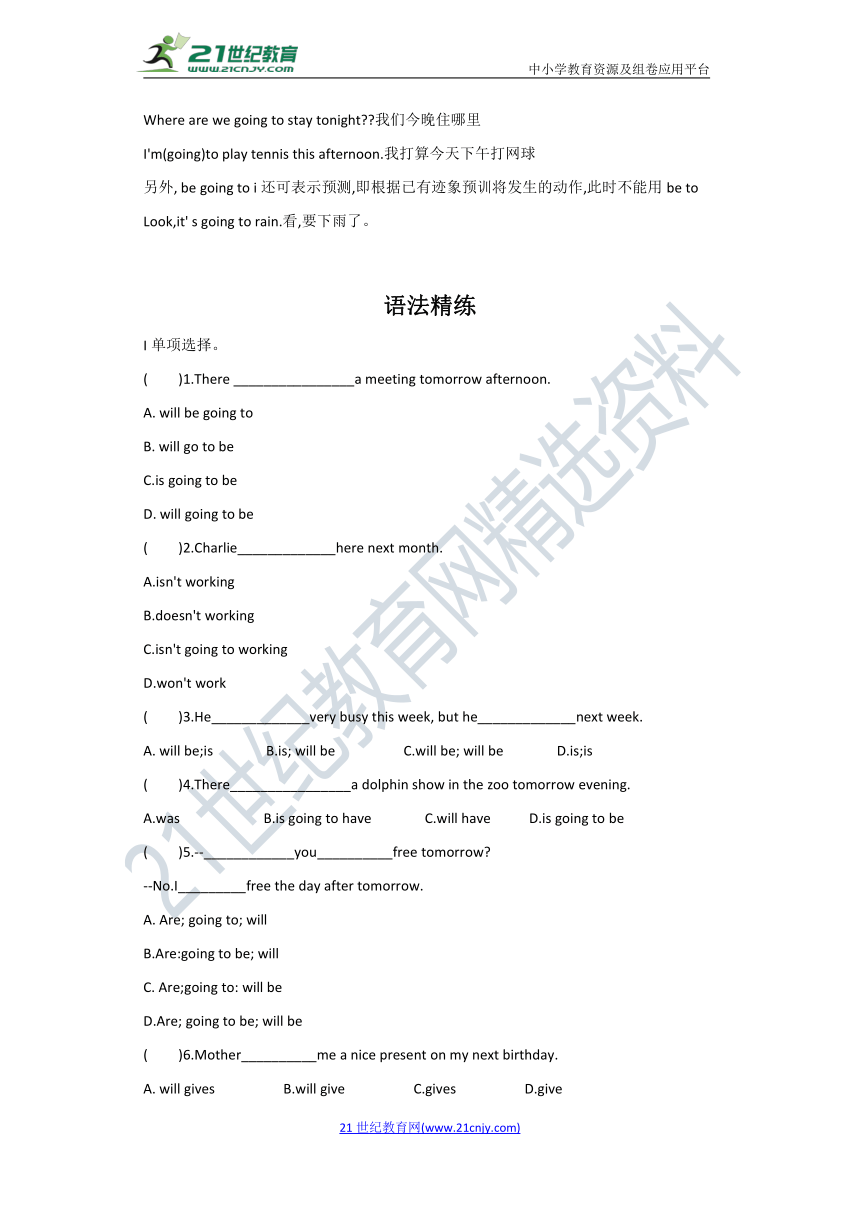Unit 7 Will people have robots? 语法精析精练
文档属性
| 名称 | Unit 7 Will people have robots? 语法精析精练 |

|
|
| 格式 | zip | ||
| 文件大小 | 1.3MB | ||
| 资源类型 | 试卷 | ||
| 版本资源 | 人教新目标(Go for it)版 | ||
| 科目 | 英语 | ||
| 更新时间 | 2021-07-22 00:00:00 | ||
图片预览




文档简介
中小学教育资源及组卷应用平台
八上Unit
7语法精析精练
语法精析
一般将来时态(二)
一、一般将来时的定义
一般将来时表示在现在看来即将要发生的动作或存在的态。常用时间副词
tomorrow,.soon或短语
next
year//week/month,
in
a
few
days,,
in
the
future,,
sometime做状语。如:
What
will
you
do
this
afternoon??你今天下午干什么?
We
will
have
a
meeting
tomorrow..我们明天要开会。
He
is
going
to
study
abroad
next
year.明年他要出国学习。
二、一般将来时的基本用法及构成
一般将来时的基本用法是表示单纯的将来事实,由“will/shall+动词原形”构成
We
shall
have
a
picnic
next
month..下个月我们将去野餐。
I
think
she
will
pass
the
exam..我想她将会通过考试。
三、表示将来时间的几种常见方法
英语中除了“will/
shall++动词原形”表示将来时态外,还可以有以下多种方法
(1)用“
be
going
tot+动词原形”表示。主要表示打算和预测:
We
are
not
going
to
stay
there
long.
我们不准备在那里待很久。(表打算)
I'm
afraid
they're
going
to
lose
the
game.
恐怕他们会输掉比赛。(表预测)
Look,it'
s
going
to
rain.I瞧,要下雨了。(表预见)
注:
be
going
to后接动词go和come时,通常直接改用其进行时态表将来:
Where
is
he
going
to
go??=
Where
is
he
going??他打算到哪里去?
(2)用“be
to+动词原形”表示。主要表示按计划或安排即将要发生的动作;有时也表示命令、禁止或可能性。
He
is
to
leave
for
Beijing
tomorrow..他决定明天去北京。
Tell
him
he''
s
not
to
be
back
late.告诉他不准晚回。
(3)用“
be
about
to十动词原形”表示。主要表示即将要发生的事
He
is
about
to
leave.他即将要离开。
Sit
down,
everyone.
The
film
is
about
to
start.大家坐好,电影马上就要开始了
注:该结构通常不与具体的时间状语连用
He
is
about
to
leave
soon[
tomorrow].
另外,该结构在美式英语中还可表示“打算”(主要用于否定句)
I'm
not
about
to
lend
him
any
more
money.
我不打算再借给他任何钱。
(4)用“
be
due
to-+动词原形”表示。主要表示按计划或时间
表将要发生某事:
He
is
due
to
leave
very
soon..他很快就要离开。
His
book
is
due
to
be
published
in
October.他的书计划10月份出版。
(5)用“现在进行时”(即“be+现在分词”)表示。主要表示按计划或安排要发生的事:
The
students
are
leaving
on
Sunday..学生们星期日出发。
We're
having
a
party
next
week..我们下星期将有一个聚会。
注:该用法有时表示即将发生的动作:
I'm
leaving..我走了
(6)用“一般现在时”表示。表示按规定或时间表预计要发生的事:
The
train
leaves
at7:25
this
evening..火车今晚7:25开。
Tomorrow
is
Wednesday..明天是星期三
We
have
a
holiday
tomorrow..我们明天放假。
注:在表示时间、条件等的状语从句以及某些名词性从句、定语从句等中,也用一般现在时表示将来意义,参见“时态详解:一般现在时”的有关用法。
四、三种将来时间表示法的比较
(1)will/
shall-+动词原形”与“
be
going
to+动词原形”
两者均可表示将来时间和意图,有时可换用,如:
I
think
it'll
rain
this
evening.
=I
think
it's
going
to
rain
this
evening..我想今晚会下雨。
I
won't
tell
you
about
it.
=I'm
not
going
to
tell
you
about
it.
我不会把这事告诉你的。
但有时有差别:
①若是强调某个意图是经过事先考虑好的,则通常要用be
going
to;;若是表示某个意图没有经过事先考虑,而是在说话的当时才临时想到的,则通常用will。比较:
-Ann
is
in
hospital
Oh,
really??
I
didn’t
know..
I'll
go
and
visit
her..(临时想法,不能用
be
going
to))
-Ann
is
in
hospital.
Yes,
I
know..I'
n
going
to
visit
her
tomorrow..(事先考虑的意图,不能用will)
②若是有迹象表明要发生某事,通常只用
be
going
to,,不用will,如
Look
at
those
black
clouds.
It's
going
to
rain.
看那些乌云,要下雨了。
③带有时间或条件状语从句的主句通常不宜用
be
going
to,而用will,如:
When
he
comes
back,
I
will
tell
him
the
news.
他回来时我就告诉他这个消息。
If
he
comes
back,
I
will
tell
him
the
news.
他若回来我就告诉他这个消息。
(2)“
be
going
to+动词原形”与“现在进行时”
①
be
going
to主要表示主观想法或意图,而用现在进行时表示将来则主要强调已经做出的安排。比较
I'm
going
to
wash
the
car
if
I
have
time.
若有时间我想洗洗车。(主观想法)
I'm
picking
you
up
at
6.Don't
forget.
我6点钟来接你,不要忘了。(已做出的安排)
②但是当要表示主观无法控制的预测时,通常要用to,不能用现在进行时态
It's
going
to
snow
before
long..不久会下雪
Things
are
going
to
get
better
soon..情很供就会好
③当表示坚持要(不要)某人做某事时,两者均可用
She's
going
to
take
that
medicine
whether
he
or
not.不管她喜欢不喜欢,她都得吃那药。
You're
not
wearing
going
to
wear
that
skirt
to
school你不可以穿那条裙子去上学。
(3)“
be
going
to十动词原形”与“be
to十动词原形”的区别
两者均可表示按计划或安排要发生的动作,有时可互换(Be
to比
be
going
to
i正式)
Where
are
we
going
to
stay
tonight??我们今晚住哪里
I'm(going)to
play
tennis
this
afternoon.我打算今天下午打网球
另外,
be
going
to
i还可表示预测,即根据已有迹象预训将发生的动作,此时不能用be
to
Look,it'
s
going
to
rain.看,要下雨了。
语法精练
I单项选择。
(
)1.There
________________a
meeting
tomorrow
afternoon.
A.
will
be
going
to
B.
will
go
to
be
C.is
going
to
be
D.
will
going
to
be
(
)2.Charlie_____________here
next
month.
A.isn't
working
B.doesn't
working
C.isn't
going
to
working
D.won't
work
(
)3.He_____________very
busy
this
week,
but
he_____________next
week.
A.
will
be;is
B.is;
will
be
C.will
be;
will
be
D.is;is
(
)4.There________________a
dolphin
show
in
the
zoo
tomorrow
evening.
A.was
B.is
going
to
have
C.will
have
D.is
going
to
be
(
)5.--____________you__________free
tomorrow?
--No.I_________free
the
day
after
tomorrow.
A.
Are;
going
to;
will
B.Are:going
to
be;
will
C.
Are;going
to:
will
be
D.Are;
going
to
be;
will
be
(
)6.Mother__________me
a
nice
present
on
my
next
birthday.
A.
will
gives
B.will
give
C.gives
D.give
(
)7.-Shall
I
buy
a
cup
of
tea
for
you?
--_______________(不,不要。)
No,
you
won't.
B.
No,
you
aren't.
C.
No,
please
don't.
D.No,
please.
(
)8.-Where
is
the
morning
paper?
--I
___________it
for
you
at
once.
A.get
B.am
getting
C.to
get
D.will
get
(
)9.________a
concert
next
Saturday?
A.
There
will
be
B.
Will
there
be
C.
There
can
be
D.There
are
(
)10.
If
they
come,
we_______a
meeting.
A.have
B.
will
have
C.had
D.
would
have
Ⅱ用所给单词的适当形式填空。
I____________(leave)in
a
minute.
I__________(finish)all
my
work
before
I
________
(leave).
2.-How
long________you________(study)in
our
country?
I
__________(plan)to
be
here
for
about
one
more
year.
I__________(hope)to
visit
the
other
parts
of
your
country.
-What_________you_________(do)after
you________(leave)
here?
--I
__________(return)home
and_______(get)a
job.
3.I
______________(be)tired.I__________(go)to
bed
early
tonight.
4.
Mary's
birthday
is
next
Monday,
and
her
mother_______(give)her
a
present.
5.It
is
very
cold
these
days.
It_________(snow)soon.
答案
语法精练
I.1-5
CDBDD
6-10
BADBB
II.1.
am
leaving;
will
finish;
leave2.
will;
study;
plan;
hope;
will;
do;
leave;
will
return;
get
3.am;
will
go
4.
will
give
5.is
going
to
snow
答案
语法精练
HYPERLINK
"http://21世纪教育网(www.21cnjy.com)
"
21世纪教育网(www.21cnjy.com)
八上Unit
7语法精析精练
语法精析
一般将来时态(二)
一、一般将来时的定义
一般将来时表示在现在看来即将要发生的动作或存在的态。常用时间副词
tomorrow,.soon或短语
next
year//week/month,
in
a
few
days,,
in
the
future,,
sometime做状语。如:
What
will
you
do
this
afternoon??你今天下午干什么?
We
will
have
a
meeting
tomorrow..我们明天要开会。
He
is
going
to
study
abroad
next
year.明年他要出国学习。
二、一般将来时的基本用法及构成
一般将来时的基本用法是表示单纯的将来事实,由“will/shall+动词原形”构成
We
shall
have
a
picnic
next
month..下个月我们将去野餐。
I
think
she
will
pass
the
exam..我想她将会通过考试。
三、表示将来时间的几种常见方法
英语中除了“will/
shall++动词原形”表示将来时态外,还可以有以下多种方法
(1)用“
be
going
tot+动词原形”表示。主要表示打算和预测:
We
are
not
going
to
stay
there
long.
我们不准备在那里待很久。(表打算)
I'm
afraid
they're
going
to
lose
the
game.
恐怕他们会输掉比赛。(表预测)
Look,it'
s
going
to
rain.I瞧,要下雨了。(表预见)
注:
be
going
to后接动词go和come时,通常直接改用其进行时态表将来:
Where
is
he
going
to
go??=
Where
is
he
going??他打算到哪里去?
(2)用“be
to+动词原形”表示。主要表示按计划或安排即将要发生的动作;有时也表示命令、禁止或可能性。
He
is
to
leave
for
Beijing
tomorrow..他决定明天去北京。
Tell
him
he''
s
not
to
be
back
late.告诉他不准晚回。
(3)用“
be
about
to十动词原形”表示。主要表示即将要发生的事
He
is
about
to
leave.他即将要离开。
Sit
down,
everyone.
The
film
is
about
to
start.大家坐好,电影马上就要开始了
注:该结构通常不与具体的时间状语连用
He
is
about
to
leave
soon[
tomorrow].
另外,该结构在美式英语中还可表示“打算”(主要用于否定句)
I'm
not
about
to
lend
him
any
more
money.
我不打算再借给他任何钱。
(4)用“
be
due
to-+动词原形”表示。主要表示按计划或时间
表将要发生某事:
He
is
due
to
leave
very
soon..他很快就要离开。
His
book
is
due
to
be
published
in
October.他的书计划10月份出版。
(5)用“现在进行时”(即“be+现在分词”)表示。主要表示按计划或安排要发生的事:
The
students
are
leaving
on
Sunday..学生们星期日出发。
We're
having
a
party
next
week..我们下星期将有一个聚会。
注:该用法有时表示即将发生的动作:
I'm
leaving..我走了
(6)用“一般现在时”表示。表示按规定或时间表预计要发生的事:
The
train
leaves
at7:25
this
evening..火车今晚7:25开。
Tomorrow
is
Wednesday..明天是星期三
We
have
a
holiday
tomorrow..我们明天放假。
注:在表示时间、条件等的状语从句以及某些名词性从句、定语从句等中,也用一般现在时表示将来意义,参见“时态详解:一般现在时”的有关用法。
四、三种将来时间表示法的比较
(1)will/
shall-+动词原形”与“
be
going
to+动词原形”
两者均可表示将来时间和意图,有时可换用,如:
I
think
it'll
rain
this
evening.
=I
think
it's
going
to
rain
this
evening..我想今晚会下雨。
I
won't
tell
you
about
it.
=I'm
not
going
to
tell
you
about
it.
我不会把这事告诉你的。
但有时有差别:
①若是强调某个意图是经过事先考虑好的,则通常要用be
going
to;;若是表示某个意图没有经过事先考虑,而是在说话的当时才临时想到的,则通常用will。比较:
-Ann
is
in
hospital
Oh,
really??
I
didn’t
know..
I'll
go
and
visit
her..(临时想法,不能用
be
going
to))
-Ann
is
in
hospital.
Yes,
I
know..I'
n
going
to
visit
her
tomorrow..(事先考虑的意图,不能用will)
②若是有迹象表明要发生某事,通常只用
be
going
to,,不用will,如
Look
at
those
black
clouds.
It's
going
to
rain.
看那些乌云,要下雨了。
③带有时间或条件状语从句的主句通常不宜用
be
going
to,而用will,如:
When
he
comes
back,
I
will
tell
him
the
news.
他回来时我就告诉他这个消息。
If
he
comes
back,
I
will
tell
him
the
news.
他若回来我就告诉他这个消息。
(2)“
be
going
to+动词原形”与“现在进行时”
①
be
going
to主要表示主观想法或意图,而用现在进行时表示将来则主要强调已经做出的安排。比较
I'm
going
to
wash
the
car
if
I
have
time.
若有时间我想洗洗车。(主观想法)
I'm
picking
you
up
at
6.Don't
forget.
我6点钟来接你,不要忘了。(已做出的安排)
②但是当要表示主观无法控制的预测时,通常要用to,不能用现在进行时态
It's
going
to
snow
before
long..不久会下雪
Things
are
going
to
get
better
soon..情很供就会好
③当表示坚持要(不要)某人做某事时,两者均可用
She's
going
to
take
that
medicine
whether
he
or
not.不管她喜欢不喜欢,她都得吃那药。
You're
not
wearing
going
to
wear
that
skirt
to
school你不可以穿那条裙子去上学。
(3)“
be
going
to十动词原形”与“be
to十动词原形”的区别
两者均可表示按计划或安排要发生的动作,有时可互换(Be
to比
be
going
to
i正式)
Where
are
we
going
to
stay
tonight??我们今晚住哪里
I'm(going)to
play
tennis
this
afternoon.我打算今天下午打网球
另外,
be
going
to
i还可表示预测,即根据已有迹象预训将发生的动作,此时不能用be
to
Look,it'
s
going
to
rain.看,要下雨了。
语法精练
I单项选择。
(
)1.There
________________a
meeting
tomorrow
afternoon.
A.
will
be
going
to
B.
will
go
to
be
C.is
going
to
be
D.
will
going
to
be
(
)2.Charlie_____________here
next
month.
A.isn't
working
B.doesn't
working
C.isn't
going
to
working
D.won't
work
(
)3.He_____________very
busy
this
week,
but
he_____________next
week.
A.
will
be;is
B.is;
will
be
C.will
be;
will
be
D.is;is
(
)4.There________________a
dolphin
show
in
the
zoo
tomorrow
evening.
A.was
B.is
going
to
have
C.will
have
D.is
going
to
be
(
)5.--____________you__________free
tomorrow?
--No.I_________free
the
day
after
tomorrow.
A.
Are;
going
to;
will
B.Are:going
to
be;
will
C.
Are;going
to:
will
be
D.Are;
going
to
be;
will
be
(
)6.Mother__________me
a
nice
present
on
my
next
birthday.
A.
will
gives
B.will
give
C.gives
D.give
(
)7.-Shall
I
buy
a
cup
of
tea
for
you?
--_______________(不,不要。)
No,
you
won't.
B.
No,
you
aren't.
C.
No,
please
don't.
D.No,
please.
(
)8.-Where
is
the
morning
paper?
--I
___________it
for
you
at
once.
A.get
B.am
getting
C.to
get
D.will
get
(
)9.________a
concert
next
Saturday?
A.
There
will
be
B.
Will
there
be
C.
There
can
be
D.There
are
(
)10.
If
they
come,
we_______a
meeting.
A.have
B.
will
have
C.had
D.
would
have
Ⅱ用所给单词的适当形式填空。
I____________(leave)in
a
minute.
I__________(finish)all
my
work
before
I
________
(leave).
2.-How
long________you________(study)in
our
country?
I
__________(plan)to
be
here
for
about
one
more
year.
I__________(hope)to
visit
the
other
parts
of
your
country.
-What_________you_________(do)after
you________(leave)
here?
--I
__________(return)home
and_______(get)a
job.
3.I
______________(be)tired.I__________(go)to
bed
early
tonight.
4.
Mary's
birthday
is
next
Monday,
and
her
mother_______(give)her
a
present.
5.It
is
very
cold
these
days.
It_________(snow)soon.
答案
语法精练
I.1-5
CDBDD
6-10
BADBB
II.1.
am
leaving;
will
finish;
leave2.
will;
study;
plan;
hope;
will;
do;
leave;
will
return;
get
3.am;
will
go
4.
will
give
5.is
going
to
snow
答案
语法精练
HYPERLINK
"http://21世纪教育网(www.21cnjy.com)
"
21世纪教育网(www.21cnjy.com)
同课章节目录
- Unit 1 Where did you go on vacation?
- Section A
- Section B
- Unit 2 How often do you exercise?
- Section A
- Section B
- Unit 3 I'm more outgoing than my sister.
- Section A
- Section B
- Unit 4 What's the best movie theater?
- Section A
- Section B
- Unit 5 Do you want to watch a game show?
- Section A
- Section B
- Unit 6 I'm going to study computer science.
- Section A
- Section B
- Unit 7 Will people have robots?
- Section A
- Section B
- Unit 8 How do you make a banana milk shake?
- Section A
- Section B
- Unit 9 Can you come to my party?
- Section A
- Section B
- Unit 10 If you go to the party, you'll have a grea
- Section A
- Section B
